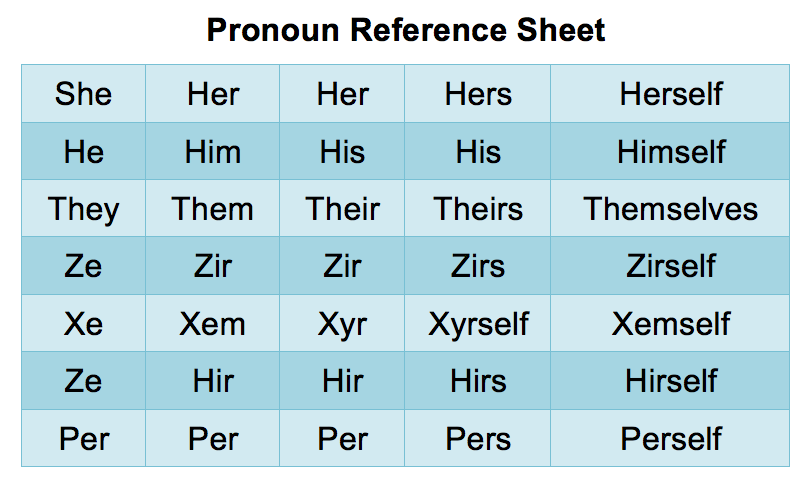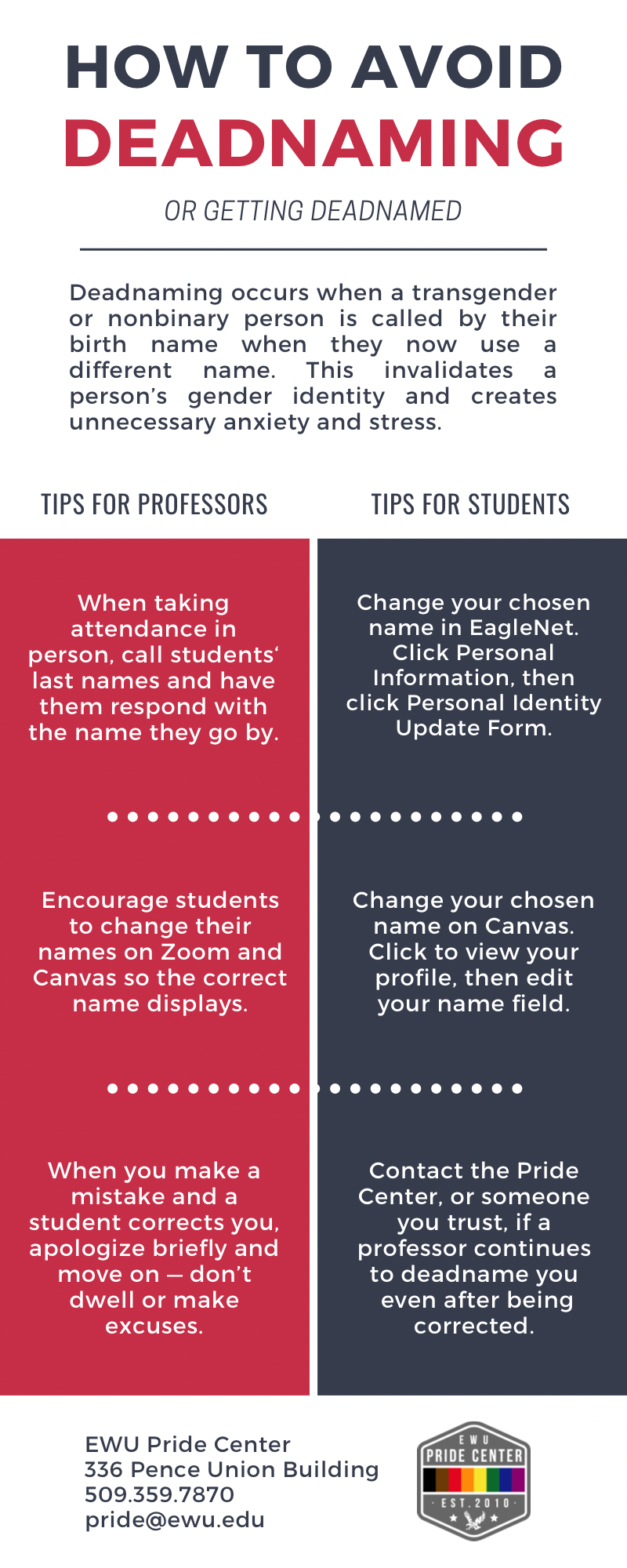So far in my blog, I’ve discussed a variety of topics: representation in the media -both good and bad- the progression of marvel and their own diversity and intersectionality, and transgender athletes and the importance of showcasing such identities within sports and hobbies. However, informative this might be, I wanted to take a different route for this blog post; something educational.
First, let’s talk pronouns:
As we all learned in elementary school English, pronouns, according to Collins Dictionary, is, “a word that you use to refer to someone or something when you do not need to use a noun, often because the person or thing has been mentioned earlier.” Some examples of pronouns include, but are not limited to: he, him, his, she, her, hers, them, them, theirs, it, its, etc. Pronouns are not just used in accordance with people either, they can and are used to describe inanimate objects, animals, “things” etc.
Now, why are pronouns important?
Pronouns, in simple, are ways to refer to things without using their name. Typically, when talking about a man or masculinely aligned person, you use he/him/his set of pronouns, and inversely for a woman or for a femininely aligned person, you would use she/her/hers set of pronouns. However, what do you use if you don’t know how someone identifies? Or what if someone doesn’t identify as either?
Many people, myself included, appreciate the use of they/them/theirs. When you are uncertain of a person’s pronouns, it is always okay to ask, however, if that makes you feel uncomfortable, try to use gender-neutral pronouns. Remember though, that if someone corrects you or if you do know someone’s preferred pronouns and they don’t consist of they/them/theirs, don’t use them! Using gender-neutral pronouns when you know that someone doesn’t like them is still misgendering; it’s understandable if you aren’t sure, but once you know, try not to use them anymore.
Okay okay, time for a controversial one: neopronouns. Neopronouns are words created to serve as pronouns, without expressing gender. I don’t want to spend too much time discussing neopronouns because it always feels like a debate, so I’m just going to give a few examples, explain why people may use them, and move on.
Many people who use neopronouns are often neurodivergent, which, according to Oxford Dictionary, is defined as, “differing in mental or neurological function from what is considered typical or normal (frequently used with reference to autistic spectrum disorders); not neurotypical.” Some examples of neurodivergence are; ASD (Autism Spectrum Disorder), OCD (Obsessive Compulsive Disorder), ADHD (Attention-Deficit Hyperactive Disorder), etc. So, many of the people who use or align with neopronouns often do so because they can not emotionally or mentally align with pronouns such as he/him/his, she/her/hers, or they/them/theirs. Some examples of neopronouns can be seen in the image above/off to the side. Although these are new, please just always try to keep an open mind. It is also important to note that many people who use neopronouns are completely aware that people most likely won’t use them in the “real” world, many times people only use them in private settings or with people they are comfortable with.
It’s not impossible to have more than one set of pronouns either; I, for example, use they/them/theirs or he/him/his most of the time. What this means is that you can address me using either set. Continuing off of that, it’s also important to remember that pronouns can change; people are complex and they go through many stages in life, both in terms of their own gender identity and in other ways. Always try to be open-minded and patient!
So, your friend came out as trans; what now?
If a family, friend, or loved one comes out to you as transgender, it is so important to remind them that you care for them. Coming out can be terrifying; them disclosing this information to you is a huge sign that they trust you, don’t mess that up.
Additionally, don’t be afraid to ask questions! This is confusing and we all know that. Asking questions is important so that there is no confusion in the future. It also shows your loved ones that you care about this part of them and that you want to know more!
It is also important to remember not to be upset that they might be scared, or that it took them a while to tell you; absolutely do not say things like “why were you scared”, “you know I love you”, “how could you think I’d be mad” etc. Again, we know you have good intentions, but all this does is create a hostile environment and make your friend or loved one go on the defensive and feel guilty. Coming out is scary and nerve-wracking regardless of who it is, sometimes even more so when it is someone who you love and who loves you. When I first came out to my best friend of 15 years, I was shaking and crying, coming out through a panic attack, all because I was terrified that it would cause the end of our friendship. Always keep in mind that if it’s scary, hard, or confusing for you, it’s just as scary, hard, and confusing for us.
Third, what to do if someone is being ignorant:
Currently, I am enrolled in a women’s and gender studies class here at Penn State and, although I love it, it can be a little overwhelming at times. Everyone in that class is so sweet and the material has been incredibly informative and interesting, however, it has also led me to realize how little many cis people know about being transgender, or about the importance of gender identity and expression. The other day in class we were discussing transgender identities and pronouns and what to do if your friend is being misgendered. Listening to the conversation, I began to see that many of them, although with positive intent I’m sure, believe that the best course of action would be to vehemently correct whoever is misgendering your friend. While this may be the case at times, it is important to keep in mind that your friends’ comfort should be the most important thing in this scenario; the whole reason you even want to correct someone is to make your friend more comfortable and support them, right? So, before you do anything, try asking your friend. Talk to them privately and ask what, if anything, they want you to do if someone misgenders them. You have to keep in mind that correcting someone can both humiliate your friend, as well as possibly put them in danger. There have been multiple occasions where I’ve been standing with a group of people when someone misgenders me and, before I can even get a word out, a friend of mine corrects or scolds the other person. Whilst I know they have good intentions and are just trying to be supportive, it can be rather embarrassing for both me and the other person, especially if we just recently met. After talking with my friends about this, they often will now have private conversations with someone if they feel as though someone was being disrespectful towards me, which I greatly appreciate and prefer.
Ignorance doesn’t just end for other people either; remember to stay aware of your own ignorance. If you misgender someone, don’t make a big deal about it or over-exaggerate how sorry you are, all this does is make the other person feel like they need to “validate” your misgender and tell you it’s okay; everyone knows it was an accident, just correct yourself and move on.

